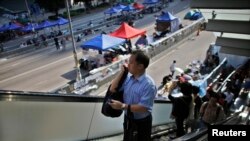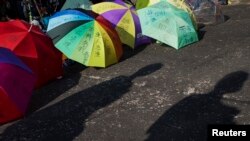Hong Kong’s pro-democracy protests have been getting massive coverage overseas.
In China, however, state media continue to limit public information about what is happening in the port city, tailoring coverage to fit the government’s narrative and position that the gathering is “illegal,” is “doomed to fail” and is a threat to Hong Kong’s democratic development.
In most parts of the world, news of the protests in Hong Kong has been competing for the top spot in the global news lineup, along with the latest developments about the Islamic State militant group in the Middle East and the Ebola crisis in West Africa.
On the streets in Beijing, several people that we spoke with did not even know about the protests.
One Beijing resident and his friend told us they did not know about “Occupy Central” but began telling us about a recent spike in cases of dengue fever in Guangzhou, thinking that was the news we were referring to.
Aware, not willing to talk
Some were aware, but because of the political nature of the topic, were unwilling to share their views.
One woman said that regardless of whether it is Beijing or Hong Kong, people should put stability first. She said the public benefits the most from stability and suffers the most when there is instability.
When asked what she thought about the students’ demands, she said hasn’t been following the news that closely.
An older Beijing resident, surnamed Liu, said the United States has its own version of democracy and so does China.
Liu said China’s version is both democratic and requires the centralization of authority. If there is democracy, but no central authority, then the country will be in chaos, he added.
Liu said he does not think the impact of the protests will be that big or last much longer. The government in Hong Kong cannot let it go on endlessly.
However, not all were convinced that the protests were bad.
One younger Beijing resident, surnamed Wang, said he has seen reports about the protests, but really does not understand what it is all about, adding that he would like to know more but cannot seem to find any information about their core demands.
Wang said he has a friend who is in Hong Kong for the National Day holiday and that he sent some pictures of the students protesting. He said it looked a little chaotic, but not as bad as he had thought it would be.
In Chinese state media, however, there is only one view and that is that the protests are illegal and misguided.
Western broadcasts
Broadcasts of Western news media, such as CNN and BBC, are silenced whenever supporters of Occupy Central or the students voice their views on news broadcasts in China.
And those who track the country’s censorship of social media, say more postings on China’s Weibo and other sites are being taken down now than when the country marked the 25th anniversary of the bloody Tiananmen crackdown earlier this year.
The pro-Communist Party publication, the People’s Daily, has been devoting increasing attention to denouncing the protests.
An opinion piece in the newspaper Monday blasted the protests, calling them anti-democratic. The article, entitled “Occupy Central is Democracy in Reverse,” argued that it was not until the change from British colonial rule to Chinese rule that Hong Kong began to democratize.
It also said that 150 years of British rule had made some in Hong Kong “hostile to democracy,” arguing that the period had planted what it called seeds of hostility toward democracy.
China’s main state broadcaster CCTV has given the protests only a smattering of coverage so far, but on Monday devoted 10 minutes to the topic, interviewing anti-Occupy Central supporters and citizens upset about the disruptions.
Their reporting also included comments from Singaporean Prime Minister Lee Hsien-loong, who was in support of China’s view.





